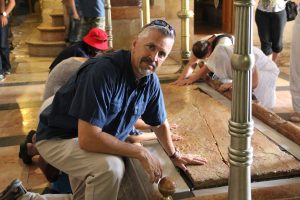
“I have been reminded of your sincere faith, which first lived in your grandmother Lois and in your mother Eunice and, I am persuaded, now lives in you also” (2 Timothy 1:5 NIV).
The church of my youth had annual revival services. We would often have an evangelist come and share how God had miraculously saved him from a life of sin. He would preach with fiery enthusiasm and through tears about how God had taken a former drunkard, (or addict, thief, murderer, etc.) and saved him.
These “Damascus Road” testimonies were amazing to me. I was envious of their certainty and passion. As a boy, I often doubted my salvation because I hadn’t had such an awesome conversion. I had no flash of light, no voice of God. At age eight, I had just decided to give my life to Jesus the way my mother and grandmother had taught me.
As I grew in my faith, I no longer doubted my salvation, but I still sometimes wished that my testimony was more exciting. Why couldn’t I have a testimony more like the apostle Paul’s?
Maybe that’s what Timothy was feeling when Paul wrote him that second letter. Paul was so fearless and certain when he testified of his faith, but Timothy was a little timid. When he compared himself to his mentor he just didn’t feel like he measured up.
Paul would have none of that. He reminded Timothy of the spiritual legacy that his mother and grandmother had given him. Timothy had been spared the suffering and sorrow of Paul’s many mistakes before coming to Christ. Paul reminded Timothy that the “sincere faith” which had “lived” in his mother and grandmother, now “lived” in him.
As a grown man, I’m glad that I have a “Timothy testimony.” The two most influential people in my spiritual development were women. They were my grandmother Ettie and my mother Wilda. They didn’t have the same names as “Eunice and Lois”, but they did have the same “sincere faith” living in them.
Sincere faith. The kind that is more than religion, more than rules and ritual. These women loved and lived for their Lord in such a sincere way that what they passed on to me was more caught than taught.
My mother and her mother are with Jesus now, but their sincere faith still lives here in me.
Happy Mother’s Day.
(This is a reprint of my blog from May 2010.)


 “And he said to them, ‘I have earnestly desired to eat this Passover with you before I suffer'” (Luke 22:15 ESV).
“And he said to them, ‘I have earnestly desired to eat this Passover with you before I suffer'” (Luke 22:15 ESV).





